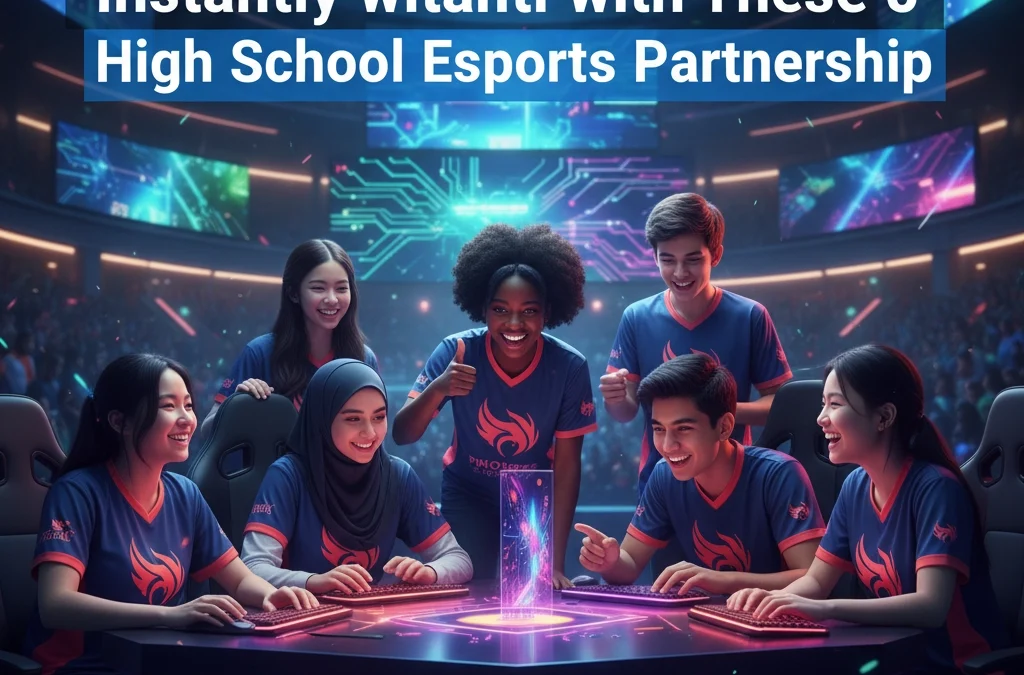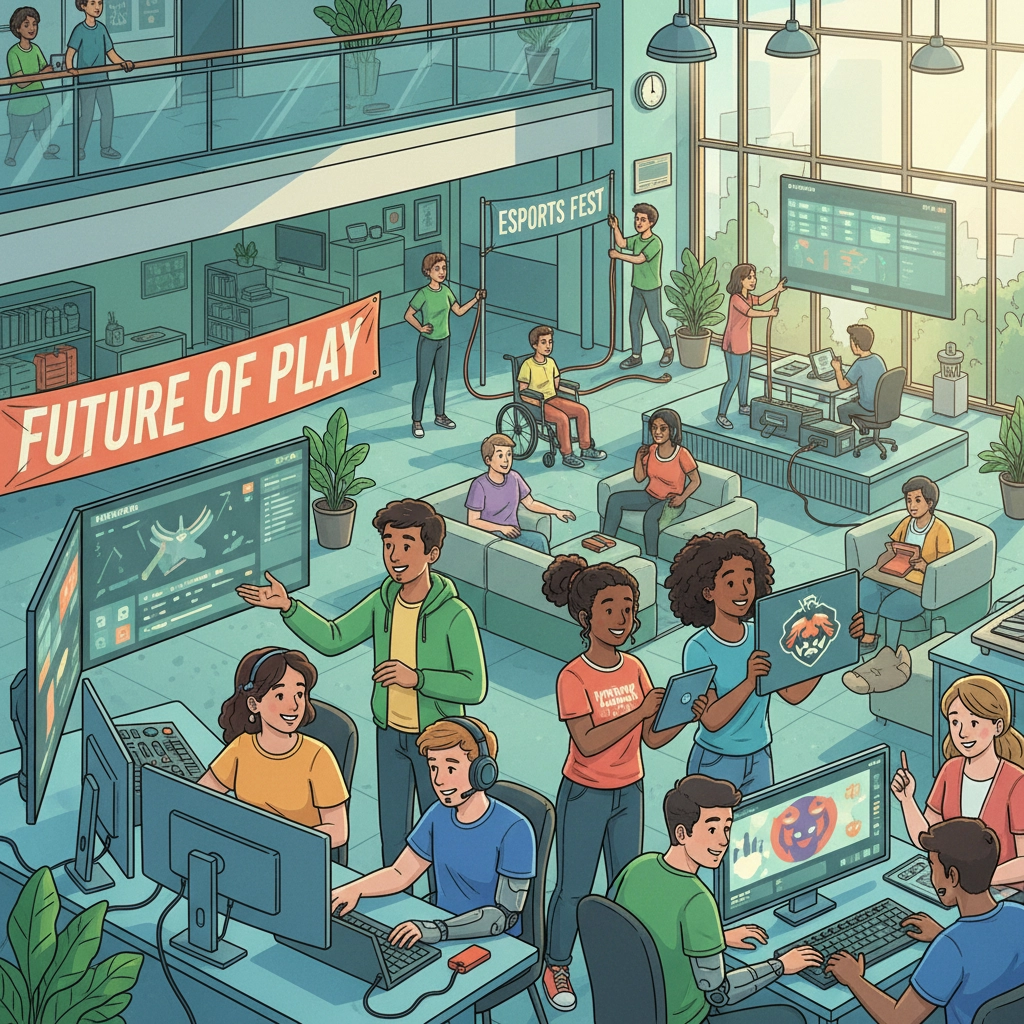Corporate diversity, equity, and inclusion initiatives have never been more critical: or more scrutinized. While traditional DEI programs often take years to show measurable results, high school esports partnerships offer brands an unprecedented opportunity to create immediate, authentic impact while building genuine connections with the next generation of consumers and employees.
Unlike conventional school activities that often reinforce existing social hierarchies, esports naturally attracts students who typically don't participate in traditional programs. This creates a uniquely inclusive environment where brands can demonstrate real commitment to diversity while achieving exceptional engagement rates that far exceed standard marketing channels.
The numbers speak volumes: well-orchestrated esports campaigns achieve 4.5% engagement rates compared to the standard 1-2% for most brands. More importantly, these partnerships create lasting relationships with diverse communities who become genuine brand ambassadors, not just demographic targets.
Tip 1: Align with Established DEI-Focused Esports Organizations
The fastest path to meaningful DEI impact begins with partnering with organizations that have diversity and inclusion embedded in their foundational principles. The North America Scholastic Esports Federation (NASEF) exemplifies this approach, requiring all club members to adhere to a strict Code of Conduct that prioritizes diversity and respect as core values.
Why does this matter for your brand? When you partner with established DEI-focused organizations, you're not starting from zero: you're amplifying existing frameworks that already attract and support underrepresented students. NASEF's expansion from Southern California to schools nationwide, including strategic partnerships with 10 magnet schools in Miami-Dade Florida, demonstrates how quickly your brand can scale its DEI impact through the right organizational alliance.
These partnerships provide immediate credibility and access to diverse student populations across the country and internationally. Rather than spending months or years building trust with individual schools, you can leverage existing relationships and proven track records to create authentic impact from day one.
Action Steps for Implementation:
- Research organizations with documented DEI success stories
- Evaluate their geographic reach and demographic diversity
- Assess their existing corporate partnership frameworks
- Negotiate co-branding opportunities that highlight your shared values
Tip 2: Sponsor Non-Gaming Roles to Maximize Inclusion
Here's a game-changing insight that most brands overlook: participation in high school esports doesn't require playing video games. This fundamental misunderstanding costs companies countless opportunities to reach diverse student populations who possess valuable skills but may not identify as "gamers."
Mark Godinez's innovative approach at South Dade Senior High School illustrates this strategy's transformative potential. By incorporating fan art creation, hosting opportunities, directing roles, IT support, and marketing positions, he successfully expanded participation beyond traditional gaming demographics, particularly attracting more young women and non-binary students.
Your brand can sponsor equipment, workshops, and competitions for these creative and technical roles, immediately increasing program appeal to students with diverse interests and skills. Consider the multiplier effect: every non-gaming role you support potentially brings in students who might otherwise never engage with esports: or your brand.
Strategic Sponsorship Opportunities:
- Fan Art and Creative Content: Sponsor digital art software, tablets, and design competitions
- Broadcasting and Media: Provide streaming equipment and video editing tools
- Event Management: Support organizational tools and leadership training
- Technical Support: Fund IT equipment and certification programs
Tip 3: Create Intentional Programming for Underrepresented Groups
Generic diversity initiatives often fail because they don't address specific barriers faced by underrepresented communities. The collaboration between NASEF and GameHERS demonstrates the power of targeted programming, specifically developing "impactful content and programming for girls in the high school esports space."
This intentional approach recognizes that simply opening doors isn't enough: you must actively create welcoming environments and remove systemic barriers. Your brand partnership should include specific initiatives that go beyond general participation to actively recruit and support underrepresented groups.
Bradford Harris's work with TEXSEF in Texas provides another compelling model. Rather than imposing one-size-fits-all solutions, his approach customizes programming to fit individual school needs and demographic challenges. Some schools benefit from after-school programs, while others integrate esports into daily curriculum. Your brand partnership should demonstrate similar cultural competency and flexibility.
Targeted Initiative Examples:
- Mentorship Programs: Pair students with industry professionals from similar backgrounds
- Scholarship Funds: Create dedicated funding for underrepresented students
- Safe Space Programming: Support anti-harassment training and inclusive community building
- Career Pathway Development: Showcase diverse role models and career opportunities
Tip 4: Implement Flexible, Needs-Based Partnership Models
The most impactful DEI partnerships recognize that different communities face unique challenges and opportunities. A rural school might need different diversity strategies than an urban school, and your brand can demonstrate cultural competency by adapting its approach accordingly.
This flexibility extends beyond demographics to operational considerations. Some schools excel with competitive teams, while others thrive with collaborative learning environments. Some students need after-school programming due to work obligations, while others can participate during regular school hours.
Your partnership model should offer various support levels and engagement types, allowing schools to choose approaches that best serve their specific student populations. This customization doesn't just improve program effectiveness: it demonstrates genuine respect for local communities and their unique needs.
Flexible Partnership Components:
- Modular Equipment Packages: Scalable from single stations to full labs
- Varied Time Commitments: Options for semester-long, year-long, or summer programs
- Multiple Engagement Levels: From basic sponsorship to comprehensive curriculum integration
- Customizable Branding: Respectful co-branding that honors local school identity
Tip 5: Measure and Amplify Impact Through Student Success Stories
The most powerful way to demonstrate your brand's DEI commitment is through documented student outcomes and career pathway development. Mark Godinez emphasizes building connections rather than just exploration, helping students understand how their esports involvement translates to future professional opportunities.
Joey Gawyrsiak's program at Shenandoah University has been "nominated for awards because of our diversity," illustrating how DEI-focused esports programs gain recognition and inspire additional partnerships. Your brand can leverage this recognition to create a ripple effect of positive change across the esports community.
Document and share success stories, particularly highlighting students from underrepresented backgrounds who have benefited from your partnership. These narratives serve multiple purposes: they provide accountability for your DEI initiatives, inspire other students to participate, and demonstrate authentic impact to stakeholders.
Impact Measurement Framework:
- Quantitative Metrics: Participation rates by demographic, retention statistics, academic performance improvements
- Qualitative Outcomes: Student testimonials, career pathway success stories, community feedback
- Long-term Tracking: Post-graduation follow-up, career placement rates, continued brand engagement
- Award Recognition: Industry acknowledgments, educational honors, community recognition
The Competitive Advantage of Authentic DEI Partnerships
High school esports partnerships offer brands an unmatched opportunity to create measurable DEI impact while building authentic relationships with diverse communities. Unlike traditional marketing approaches that often feel transactional, these partnerships create genuine value for students who "are normally alone at breaks" but flourish when given the right opportunities.
These students often become deeply engaged community members and authentic brand ambassadors who appreciate your support not as a demographic target, but as individuals whose potential you've helped unlock. This emotional connection translates to long-term brand loyalty that extends far beyond the high school years.
The esports industry's rapid growth, combined with its natural inclusivity, positions your brand at the forefront of both cultural change and market opportunity. By implementing these five partnership strategies, you're not just checking DEI boxes: you're investing in relationships and communities that will drive your brand's success for years to come.
Ready to transform your DEI initiatives from checkbox compliance to community impact? The students are waiting, the opportunities are abundant, and the time is now. Your brand's authentic commitment to diversity, equity, and inclusion can create ripple effects that extend far beyond any single program or partnership.
The question isn't whether you can afford to invest in high school esports partnerships: it's whether you can afford not to. In an increasingly competitive marketplace where authenticity matters more than ever, these partnerships offer the rare combination of genuine social impact and exceptional business results.





